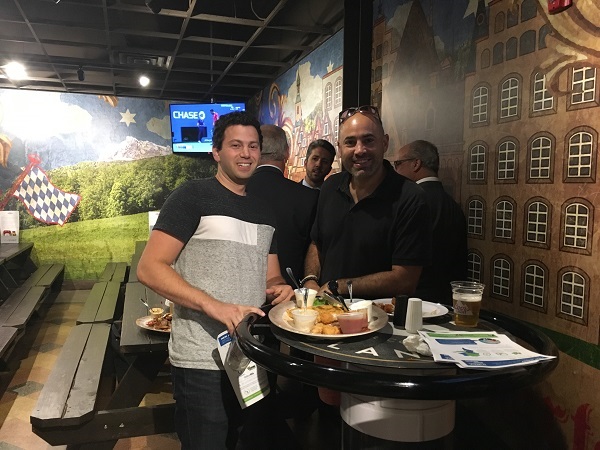What Makes New Jersey’s Sports Betting Ecosystem a Model for Other States?
With the professional football season starting, officials from the New Jersey Economic Development Authority (NJEDA) and New Jersey’s Division of Gaming Enforcement held a networking event in Newark to celebrate the successful establishment of the sports betting industry in the state.
Sports wagering generated $127.5 million in gross revenues in 2019 through July 31 for New Jersey. The sports wagering gross revenue for July 2019 alone was $17.9 million, up more than $14 million from $3.8 million in July 2018. In both May and July, New Jersey led the nation in the amount of money bet on sporting events.
Officials noted that 80 percent of online betting in New Jersey takes place on mobile devices. Tech allows this industry to exist here, officials said, and is essential to its continued success.
While the event attracted only a small number of participants, attendees were optimistic about the future of sports betting in New Jersey.
“From an NJEDA perspective, we are here to nurture this industry. We’d like to see it grow,” NJEDA Senior Advisor Bill Penders told the group. “So, by connecting the dots between all interested parties and constituents and listening to your strategies and concerns, we can help you grow and maximize your business model.”
During the networking portion of the event NJTechWeekly.com learned that sports wagering companies that have entered New Jersey are opening offices in Newark, Jersey City and Hoboken, the so-called PATH Corridor.
Also, much of New Jersey’s sports betting industry is driven by high-tech companies that provide applications for betting. This creates opportunities for startups in New Jersey’s technology sector to grow as the sports wagering industry expands and, in turn, creates job opportunities for skilled workers.
Companies have been entering the New Jersey market from elsewhere in the U.S., but also from Canada and Europe. Dave Rebuck, director of the New Jersey Division of Gaming Enforcement, said that he advised companies in this industry not to wait to come to New Jersey. “You have the opportunity to come into New Jersey and get situated and be rated at the highest level of expertise,” he said. New Jersey has developed a regulatory model that is being followed by other states, so “you’ll have a calling card for other opportunities throughout the country.”
He added, “We rely on your expertise. You can come to us with ideas, concepts, opportunities and innovations. We want to take the best of what they have in Europe and the best of what they have in Nevada, and make a New Jersey model that can be used throughout the United States.” Rebuck noted that the state is willing to hear about any difficulties companies have with regulations affecting the sports betting market, and will try to help them deal with any problems.
Speaking to companies coming into New Jersey from Europe, Rebuck noted that the Division of Gaming Enforcement works closely with the NJEDA, which will guide them through the process of entry into the U.S. market, particularly in New Jersey. “We are happy to see people come to Atlantic City, get licensed, get operational and let the state make some money from sports wagering,” he said.

Aaron Price, president and CEO of the New Jersey Tech Council, told the group about Propelify, the tech festival coming to Hoboken on October 3. Now that Propelify is under the auspices of the Tech Council, “we now have one united voice representing the tech community around the state,” he said.
“My view about New Jersey is that we should lean in on our strengths, find places where we differentiate ourselves in the market. In Hoboken, I was constantly pulled into the New York market, and I don’t believe we can compete in areas where New York thrives. I think there is opportunity for us in fintech, ecommerce and healthcare, and certainly in the sports betting industry.”
The state has a sports betting policy that is “welcoming, friendly and aggressive,” Price noted. “When we look at opportunities to draw startups, sports wagering is now a category we can promote.”
Also participating in the event was Guillermo Artiles, a partner specializing in government affairs and information technology at the law firm McCarter & English (Newark). Artiles, who had been working for Governor Phil Murphy in Trenton, said that we in New Jersey “truly have a governor who knows where this industry is going, and knows that it takes a lot of different people and stakeholders to create a real ecosystem around it.”
Price added that, while the event wasn’t as well attended as “we all might have hoped,” neither was the first New Jersey Tech Meetup, which now has 7,000-plus members. “It’s precisely these things that we need more of in New Jersey to make the ecosystem thrive,” he said.
The NJEDA plans another event in Atlantic City right before March Madness, which is the biggest betting event for basketball, and sports in general, even bigger than the Super Bowl. “We experienced March Madness for the first time in Atlantic City, and it was just madness,” Rebuck said. “It really helps our racetracks and our casinos when you have a four-day event of that caliber that brings people in to enjoy the party.”




